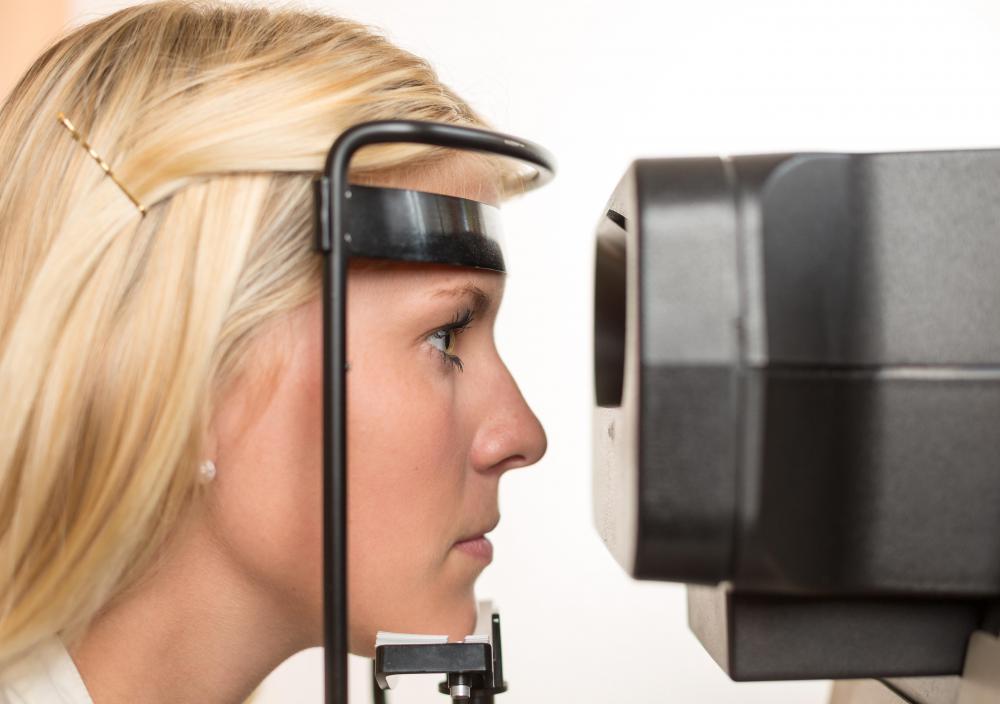At TheHealthBoard, we're committed to delivering accurate, trustworthy information. Our expert-authored content is rigorously fact-checked and sourced from credible authorities. Discover how we uphold the highest standards in providing you with reliable knowledge.
What is an Optometrist?
An optometrist is a doctor of optometry (O.D.), rather than a medical doctor. The optometrist is licensed to conduct eye exams, prescribe corrective contact lenses and glasses, and diagnose and treat eye disease. He or she will work through various vision therapies to treat abnormalities, and can prescribe drugs for the eyes. If surgery is required, the patient is sent to an ophthalmologist (M.D.).
Many people mistakenly believe that an ophthalmologist, as a medical doctor, is better to see for routine eye exams than an optometrist. Though there is nothing wrong with seeing an ophthalmologist, his or her expertise is in surgery, while the optometrist specializes in the kind of care required for routine eye exams and noninvasive therapies and treatments for eye disease. An ophthalmologist will normally have higher fees than an optometrist, and might hand off much of the routine exam to an in-house optometrist anyway. If a problem arises that can be treated with surgery or alternate therapies, the ophthalmologist might be more likely to suggest surgery, while the optometrist will likely exhaust other potential treatments first. Unless a problem exists that requires an ophthalmologist, an optometrist will likely be a more cost-effective choice for routine eye care.

In the United States, a person that has completed at least three years of higher education at an accredited university or college is eligible to attend an accredited four-year school in optometry. This is followed by state board examinations, both written and clinical. The optometrist may then choose to complete an additional one-year residency to specialize in any number of areas including family practice, ocular disease, pediatric optometry and vision therapy.

Today many shopping malls have "vision centers" that offer eye exams by a licensed optometrist, while corrective glasses are made on the premises as well. Craftspeople who grind the lenses are called opticians. Unlike optometrists and ophthamologists, opticians do not require a license and cannot conduct eye exams or treat patients.
A routine eye exam is generally recommended at least once yearly. If you are experiencing problems with your vision such as blurriness, burning or stinging, dryness or loss of visual acuity, it is wise to see an optometrist immediately.
AS FEATURED ON:
AS FEATURED ON:















Discussion Comments
Optometrists are some of the best doctors out there. Throughout my life they have helped me greatly with my eyes. even when I was only about three years old. If you ever have problems with your eyes and you get a good doctor, I can promise you will be fully taken care of in any way possible.
Thanks for all this information on optometrists. I have been thinking that I need to set an appointment and have my eyes checked. Sounds like I should go in soon.
Less non-surgical eyecare training and expertise? Really?
MD's have virtually no training in primary eyecare and solid eye physiology. They "waste" four years in med school. Your dentist and podiatrist didn't go to med school and can do surgery, by the way.
Also, MD's have no formal training in physiological optics, geometrical optics, ophthalmic optics, binocular vision, color vision, ocular motility, low vision, neurophysiology of the eye, or refractive science. The OD spends four years learning all these things. Next time you think an MD is all knowing and has all the training, think again.
Also, ODs have more class hours of training in pharmacology than MD's. MDs do have tons of general systemic body anatomy and pathology knowledge. But that does not mean they are eye gods just because they have an MD. And besides, the new MD graduate has zero knowledge of the eye.
Optometrists have just as much medical pharmacology as an MD, as the courses were taught by MD professors and the courses are the exact same. It is true that Optometrists graduate education for four years is focused primarily on the eyes, while the majority of most Ophthalmologists is on the rest of the body to become an MD and then the vast majority of their Ophthalmology residency and fellowship is spent learning surgical procedures and techniques.
Little focus is spent by Ophthalmologists on non-surgical eye care, as this is not their specialty - eye surgery is!
That said, most ophthalmologists are competent in non-surgical care but have *less* expertise than an Optometrist whose entire graduate education was focused on eye care. Optometrists would not be allowed to prescribe and use medical eye drops if they didn't know how they work, or systemic side effects, or potential drug interactions.
Most good Ophthalmologists love Optometrists, as this symbiotic relationship frees them up to do surgery, as this is where the money is.
Exhausting ineffective medical treatments when surgery is indicated only increases costs. For example, a patient who needs glaucoma surgery is put on multiple trials of eye drops for years and then when they have lost almost all their vision is sent to the surgeon for surgery.
This has increased the cost via the drops over many years, loss of quality of life and function by leaving the patient blind and increasing the risks of the surgery being unfruitful.
The article is accurate but anon33759 is not. Optometrists have extensive training in pharmacology as well. As far as *non* surgical eye care goes, the optometrist spends more time with this focus and is therefore better able to handle such cases. They are more than merely "competent" and are the best option for your routine eye care needs.
Ophthalmologists have far more extensive training than optometrists in *non* surgical eye care. Ophthalmologists have medical school levels of training in pharmacology for instance. They will know more about how eyedrops work and their systemic side effects and potential drug interactions than an optometrist. Most optometrists are competent but have *less* expertise in non surgical eye care than Ophthalmologists as well as having less expertise in surgical eye care.
Post your comments